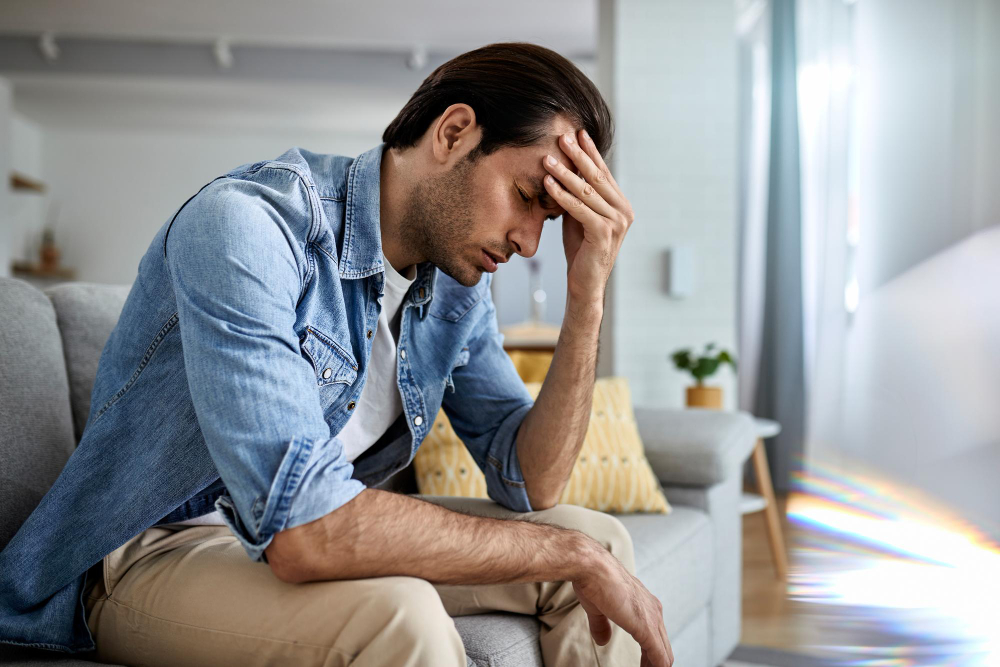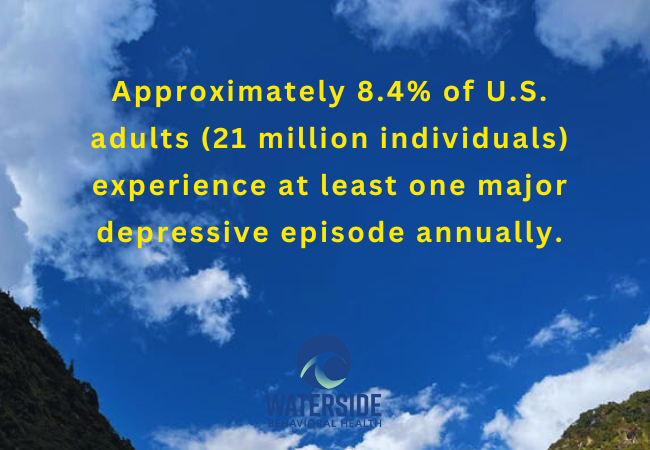Depression is one of the most common mental health disorders, affecting millions of individuals worldwide. It can significantly impact mood, energy levels, relationships, and overall well-being. When seeking treatment for depression, people often face the critical decision of choosing between therapy, medication, or a combination of both. But which approach is the best?
At Waterside Behavioral Health, we specialize in Depression Therapy in Massachusetts, offering evidence-based treatments to help individuals manage and recover from depression. Whether through Cognitive-Behavioral Therapy in Massachusetts (CBT), Dialectical Behavior Therapy in Massachusetts (DBT), or medication management, our goal is to provide personalized solutions that lead to lasting recovery.
This guide explores the pros and cons of therapy and medication, helping you determine which approach—or combination—might be best for you.
Understanding Depression and Its Impact
Depression is more than just feeling sad. It is a serious mental health condition that affects emotions, behavior, physical health, and cognitive function. Without proper treatment, depression can worsen over time, leading to complications such as suicidal thoughts, self-harm, and increased risk of substance abuse.
Seeking professional help through mental health treatment programs in Massachusetts is essential to prevent the condition from escalating.
Emotional Symptoms of Depression
- Persistent sadness, hopelessness, or emptiness
- Loss of interest in activities once enjoyed
- Feelings of guilt, worthlessness, or self-blame
- Increased irritability, frustration, or anger
Physical Symptoms of Depression
- Chronic fatigue or low energy levels
- Sleep disturbances, including insomnia or excessive sleeping
- Appetite changes leading to weight loss or gain
- Unexplained aches, pains, or digestive issues
Behavioral Symptoms of Depression
- Social withdrawal or isolation
- Avoidance of responsibilities at work or home
- Increased use of alcohol or drugs as a coping mechanism
- Engaging in self-harming behaviors or experiencing suicidal thoughts
Recognizing these symptoms early and seeking treatment from a mental health treatment center in Massachusetts can significantly improve outcomes.
Therapy for Depression: How It Works and Its Benefits
Psychotherapy (talk therapy) is a widely recognized treatment for depression, providing individuals with the tools to understand and manage their emotions more effectively.
Types of Therapy for Depression
Cognitive-Behavioral Therapy (CBT)
CBT helps individuals identify and challenge negative thought patterns, replacing them with more constructive and realistic perspectives. It teaches practical coping strategies for managing stress and encourages behavioral activation, which involves engaging in positive activities to improve mood. Cognitive-Behavioral Therapy in Massachusetts is a key component of depression treatment at Waterside Behavioral Health.
Dialectical Behavior Therapy (DBT)
DBT is a specialized form of CBT that focuses on emotional regulation, distress tolerance, and mindfulness. It is particularly beneficial for individuals with intense mood swings or those who struggle with suicidal thoughts. Dialectical Behavior Therapy in Massachusetts can help individuals build emotional resilience.
Trauma Therapy for Depression
Depression can sometimes be linked to past trauma. Trauma-focused therapies, such as Eye Movement Desensitization and Reprocessing (EMDR) or Exposure Therapy, help individuals process unresolved emotions related to traumatic experiences. Trauma Therapy in Massachusetts is designed to address the root causes of trauma-induced depression.
Psychodynamic Therapy
This therapy explores past experiences and unresolved conflicts that may contribute to depression. By understanding deep-seated emotions and patterns in relationships, individuals can develop greater self-awareness and emotional clarity.
Advantages of Therapy for Depression
- Addresses the underlying causes of depression, rather than just managing symptoms
- Provides long-term benefits by teaching coping strategies
- Encourages self-awareness and healthier relationships
- Does not involve the potential side effects associated with medication
Limitations of Therapy for Depression
- Progress can take time, requiring consistent effort and commitment
- Some individuals may need faster symptom relief, which medication can provide
- Access to therapy may be limited due to availability or financial constraints
Medication for Depression: How It Works and Its Benefits
For individuals with moderate to severe depression, medication can be a useful tool in balancing brain chemistry and alleviating symptoms.
Common Medications for Depression
Selective Serotonin Reuptake Inhibitors (SSRIs)
These medications, including Prozac, Zoloft, and Lexapro, increase serotonin levels in the brain to improve mood. SSRIs are often the first-line treatment due to their relatively mild side effects.
Serotonin-Norepinephrine Reuptake Inhibitors (SNRIs)
Examples such as Effexor and Cymbalta increase both serotonin and norepinephrine levels, offering broader symptom relief.
Atypical Antidepressants
Medications like Wellbutrin work differently than SSRIs and SNRIs, sometimes improving energy levels and focus while alleviating depressive symptoms.
Tricyclic Antidepressants (TCAs) and Monoamine Oxidase Inhibitors (MAOIs)
Older classes of antidepressants that are generally used when other medications have not been effective. These medications require careful monitoring due to potential side effects.
Advantages of Medication for Depression
- Can provide relief from symptoms within a few weeks
- Often more accessible and affordable than long-term therapy
- Effective for individuals with severe or treatment-resistant depression
Limitations of Medication for Depression
- Potential side effects, including weight gain, nausea, drowsiness, and sexual dysfunction
- Does not address the root psychological causes of depression
- Some individuals may experience withdrawal symptoms when discontinuing medication
- Finding the right medication and dosage can take weeks or months
Therapy vs. Medication: Which One is Better?
There is no one-size-fits-all answer when it comes to depression treatment. The best approach depends on an individual’s specific needs, severity of symptoms, and personal preferences.
When to Choose Therapy Alone
- If depression symptoms are mild to moderate
- If an individual prefers non-medication approaches
- If they want to develop long-term coping skills
When to Choose Medication Alone
- If symptoms are severe and significantly impact daily life
- If immediate symptom relief is needed
- If previous therapy attempts have not provided sufficient improvement
When to Combine Therapy and Medication
- If symptoms are moderate to severe and interfere with daily functioning
- If an individual has co-occurring conditions, such as anxiety or PTSD
- If a person needs immediate symptom relief while learning long-term coping strategies
Studies suggest that the most effective treatment for moderate to severe depression is a combination of therapy and medication. This approach allows individuals to experience symptom relief while working on deeper emotional healing.
Lifestyle Changes to Support Depression Treatment
In addition to therapy and medication, lifestyle modifications can significantly enhance depression recovery.
Exercise and Physical Activity
Engaging in regular exercise helps release endorphins, which naturally boost mood. Even simple activities like walking or yoga can be beneficial.
Nutrient-Rich Diet
Eating a balanced diet rich in omega-3 fatty acids, whole grains, and lean proteins supports brain function and emotional well-being.
Mindfulness and Meditation
Practicing meditation and breathing exercises can help reduce stress and promote emotional regulation.
Social Support
Connecting with friends, family, or support groups can reduce feelings of isolation and loneliness.
Consistent Sleep Schedule
Establishing a healthy sleep routine helps regulate mood and energy levels.
Find the Best Depression Treatment at Waterside Behavioral Health
If you or a loved one is struggling with depression, professional treatment can help. At Waterside Behavioral Health, we offer:
- Cognitive-Behavioral Therapy in Massachusetts
- Dialectical Behavior Therapy in Massachusetts
- Trauma Therapy in Massachusetts
- Medication management and comprehensive treatment plans
Call 774.619.7750 today to learn more about our mental health treatment programs in Massachusetts and begin your journey to healing. You don’t have to face depression alone—recovery is possible.
FAQ About Therapy vs. Medication for Depression
Is therapy or medication more effective for treating depression?
Both therapy and medication are effective for treating depression. Therapy, such as Cognitive-Behavioral Therapy (CBT), helps individuals address negative thought patterns, while medication can help regulate brain chemistry. The best approach depends on the severity of depression and individual needs.
When should someone choose therapy instead of medication?
Therapy is recommended for mild to moderate depression or for individuals who prefer a non-medication approach. It helps develop long-term coping strategies and addresses the root causes of depression.
When is medication necessary for depression?
Medication may be necessary for moderate to severe depression, especially if symptoms significantly impact daily life. It is often used when depression is resistant to therapy alone or when rapid symptom relief is needed.
What types of therapy are best for depression?
- Cognitive-Behavioral Therapy (CBT) – Focuses on changing negative thought patterns.
- Dialectical Behavior Therapy (DBT) – Helps with emotional regulation and distress tolerance.
- Trauma Therapy – Addresses past trauma that may contribute to depression.
What are the side effects of antidepressant medications?
Common side effects of antidepressants include nausea, weight changes, drowsiness, dry mouth, and sexual dysfunction. Some individuals may also experience withdrawal symptoms if medication is stopped suddenly.
How long does it take for therapy or medication to work?
- Therapy typically takes a few weeks to months for noticeable improvement.
- Medication may take 4 to 6 weeks to reach full effectiveness.
Can therapy and medication be combined for depression treatment?
Yes. Studies show that a combination of therapy and medication is often the most effective treatment for moderate to severe depression, providing both symptom relief and long-term coping skills.





